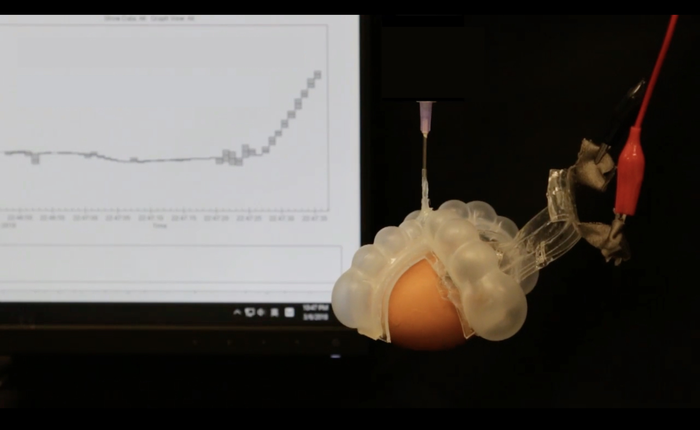Scientists build stretchable thermometer that could lead to next-gen clothing and soft robots
The thermometers can be made small, stable and even transparent, according to researchers

Scientists have developed a stretchable, self-powered thermometer, an advance that could potentially lead to next-generation soft robotics, smart clothing and medical devices compatible with the human body.
While most components used traditionally for sensing in robots and smart clothing are rigid, researchers from Harvard University said their new soft sensors are highly sensitive with their ability to sense temperature unaffected by their stretchability.
“We have developed soft temperature sensors with high sensitivity and quick response time, opening new possibilities to create new human–machine interfaces and soft robots in healthcare, engineering and entertainment,” said Zhigang Suo, senior author of the study.
Soft robots, mimicking animal or human motion, find applications in a range of fields including medical diagnostics and disaster management.
Stretchable sensors make the development of such robots much more feasible, researchers said.
The new thermometer, described in the journal PNAS on Monday, consists of three parts – an electrolyte, an electrode and a dielectric insulating material to separate the two.
The interface between the electrolyte and the dielectric, researchers said, accumulates ions while the dielectric/electrode interface accumulates electrons.
The resulting charge imbalance between the two sets up an ionic cloud in the electrolyte, the study noted.
As the temperature changes, the ionic cloud changes thickness and a voltage is generated, which is sensitive to temperature, but insensitive to stretch.
“Because the design is so simple, there are so many different ways to customise the sensor, depending on the application. You can choose different materials, arranged in different ways and optimized for different tasks,” said Yecheng Wang, a postdoctoral fellow and first author of the paper.
The researchers developed four designs for the stretchable temperature sensor by arranging the electrolyte, dielectric and electrode in different configurations.
In one test, the scientists integrated the sensor into a soft gripper and measured the temperature of a hot, hard-boiled egg.
They said the thermometer can measure temperatures upwards of 200C or as cold as -100C, adding that the sensors act really fast, responding to changes in temperature within about 10 milliseconds.
“We demonstrated that these sensors can be made small, stable, and even transparent,” Dr Wang said.
The researchers believe the new temperature sensors open up new possibilities to create human–machine interfaces and soft robots in healthcare and engineering.
“This highly customisable platform could usher in new developments to enable and improve the internet of everything and everyone,” Dr Suo added.
Join our commenting forum
Join thought-provoking conversations, follow other Independent readers and see their replies
Comments
Bookmark popover
Removed from bookmarks